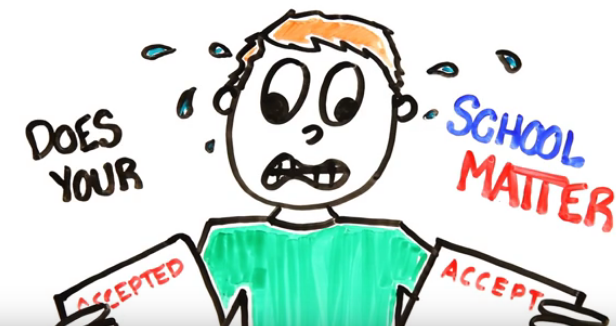We’re all told to work hard in school, so that we can get into the best colleges or universities, and be successful.
我們都被吩咐要在學(xué)校努力學(xué)習(xí),以考上最好的學(xué)校或大學(xué),成為成功人士。
But, does the school you choose actually matter?
但是,你選擇的學(xué)校真的重要嗎?
Take a look at these SAT scores for an average school which are out of 800, by the way.
看看普通學(xué)校學(xué)生所得的SAT平均分,總分是800.
Those that have the highest SAT scores end up representing over 50% of the people who get degrees at these schools, while the lowest SAT scores only represent around 18% of the people who actually graduate. Not so surprising.
那些獲得SAT最高分的學(xué)生最終在拿到學(xué)位的人中占一半以上,而那些獲得SAT最低分的學(xué)生僅占真正能畢業(yè)者的百分之十八。這毫不讓人意外。
But now let’s look at a top school, like Harvard.
但是讓我們看看頂尖學(xué)校,比如哈佛。
Here, the students with the lowest SAT scores, are still smarter than the best students at an average school.
在這里,拿最低SAT分的學(xué)生依舊比普通學(xué)校的尖子生聰明。
And yet, when we look at their rate of completion, it looks awfully similar.
而且,當(dāng)我們看到畢業(yè)率的時候,會發(fā)現(xiàn)有驚人的相似之處。
The top students represent just over 50% of people who graduate, while the lower SAT scores represent around 15% of people who actually graduate.
尖子生的畢業(yè)率占一半以上,而SAT低分者僅占百分之十五左右。
Wait, what’s going on here? This phenomenon is known as the Big Fish Little Pond Effect.
等等,這是怎么回事?這個現(xiàn)象被稱為大魚小池塘效應(yīng)。
Simply put, we compare ourselves not globally, but to our neighbours or people who are in the same boat as we are.
簡單而言,我們不會把自己跟全世界的人對比,但是會跟鄰里或者相同處境的人相比。
As a result, students at top schools compare themselves to their brilliant peers, and if you’re in the bottom half of your class, you’re likely to have feelings of inadequacy.
結(jié)果是,頂尖學(xué)校的學(xué)生會和他們出色的同學(xué)相比,如果你在班上處于中下游,你很有可能會覺得自己有所不足。
Even though compared to the rest of the world you are at the top.
盡管和世界上其他所有人相比你仍處于頂尖位置。
Who do you think has a higher incidence of suicide?
你認(rèn)為誰會有更高的自殺率?
People who live in developed countries that declare themselves as very happy, like Switzerland, Denmark and Canada or those which describe themselves as unhappy, like Italy, Greece, and Spain?
是像瑞士、丹麥和加拿大一樣聲稱自己很幸福的發(fā)達(dá)國家,還是像意大利、希臘和西班牙一樣認(rèn)為自己不幸福的國家呢?
The happy countries. If you’re depressed but everyone around you is also unhappy, you may think of yourself as normal, as opposed to being stuck around people who are happier than you.
是那些幸福的國家。如果你情緒低落,但是周圍的人也不開心,你可能會認(rèn)為自己很正常,而如果你被比你開心的人圍繞著,情況會完全相反。
Similarly, if you’re very intelligent at an elite school, you may end up being a little fish in a very big pond.
類似的,如果你在一所名校中非常出色,你也許會成為一條大池塘里的小魚。

And feeling as though you’re at the bottom impacts your confidence and ultimately your motivation.
自己在墊底的感覺會影響你的信心,最終阻礙你的積極性。
Need more statistics? 50% of US students in STEM programs drop out in the first or second year of school.
需要更多數(shù)據(jù)嗎?STEM 項(xiàng)目中一半的美國學(xué)生在第一或者第二學(xué)年就輟學(xué)了。
But for every 10 point decrease in the school’s average SAT score, degree completion rises by 2%!
但是學(xué)校的人均SAT分?jǐn)?shù)每降低10分,畢業(yè)率就上升百分之二。
Meaning, you’re much more likely to even get your degree if you don’t go to your top pick.
意味著,如果你不去自己的首選學(xué)校,則更有可能拿到你的學(xué)位證。
But who ends up being more successful in the ‘real world’?
但是現(xiàn)實(shí)世界中最終誰更成功呢?
A study looking at publications produced by economists in their first six years after graduation showed that top students in the 99th percentile ie smarter than almost every other person at the school from the top 5 schools in America were producing an impressive amount of publications.
一項(xiàng)關(guān)于經(jīng)濟(jì)學(xué)畢業(yè)生在畢業(yè)6年內(nèi)發(fā)表刊物的調(diào)查顯示智商比學(xué)校其他99%的學(xué)生高的頂尖學(xué)生——美國大學(xué)前五的畢業(yè)生發(fā)表的刊物數(shù)量驚人。
But those in the 75th percentile, still the top quarter of best students, are publishing next to nothing.
但是成績前25的這部分,雖然作為四分之一的優(yōu)秀學(xué)生,但是幾乎沒有作品刊登。
Essentially failures in their field.
可以說在自己的領(lǐng)域內(nèi)是完全的失敗了。
But if we now look at the best students from the 30 worst schools, we see that they’re publishing more than those in the top quarter of the best schools in the country.
但是如果我們看看最差30所學(xué)校的尖子生,會發(fā)現(xiàn)他們發(fā)表的刊物比優(yōu)等學(xué)校前25的好學(xué)生要多。
Clearly, your surroundings and peers matter.
很明顯,你周圍的環(huán)境和伙伴很重要。
Now, of course, this doesn’t cover every aspect of going to a top ranked school including the fact that having a degree from one of them can be a badge of honour, and may help you find a job more easily.
現(xiàn)在,當(dāng)然了,這并不涵蓋選擇頂尖學(xué)校的所有方面,包括獲得這些學(xué)校的學(xué)位是一項(xiàng)榮譽(yù)的象征,也許還能幫你更容易找到一份工作。
But, that’s if you ever even graduate.
但是,前提是你能夠畢業(yè)。
So when you’re applying for school, or even at your new college, keep in mind that whether you go to the best or worst school, the formula for success is mixed.
因此當(dāng)你申請大學(xué)的時候,或者是開始念新學(xué)院的時候,記住不管你上的是最好還是最差的學(xué)校,成功的配方都是混雜的。
Remember the importance of confidence in your abilities, and how being a Big Fish in a little pond can sometimes be more important than your school itself.
記住對自己的能力有信心十分重要,在小池塘里成為大魚有時候比學(xué)校本身更重要。











